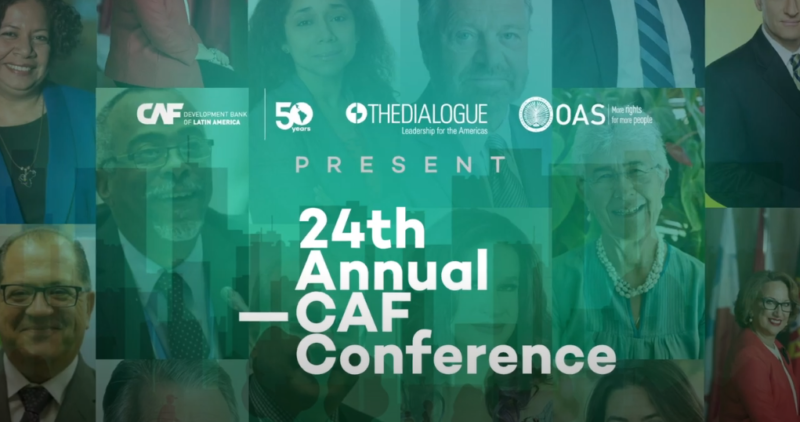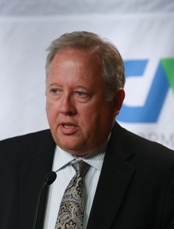Bolivia & the Global Fight Against Climate Change
In the past year, the Bolivian government has emerged as an outspoken critic of climate change policies.
On September 9, 10, and 11, 2020, over 6,000 participants from around the world convened virtually for the 24th Annual CAF Conference to discuss the most pressing issues facing the Western Hemisphere. The conference was broadcasted in three languages over the span of three days, amassing over 40,000 views on all of its streaming platforms. Established in 1996 as a joint initiative of CAF – Development Bank of Latin America, the Inter-American Dialogue, and the Organization of American States, the annual CAF Conference has become the primary forum for policy makers and analysts, journalists, government officials, business leaders, entrepreneurs and investors, and civil society leaders to review progress in the Americas and address pending challenges.
Sessions focused on: the economic recovery and the future of Latin America’s social contract; the failures and successes of healthcare systems in Latin America; the opportunities, threats, and vulnerabilities ushered in by widespread digitalization; the growing threat to democratic governance in the region; and climate change and what a “global solution” might look like in a post-pandemic world. The conference closed with an exchange with a Republican and Democratic analyst about this year’s US presidential election.
Luis Carranza, president of CAF – Development Bank of Latin America, and Michael Shifter, president of the Inter-American Dialogue, welcomed attendees and provided introductory remarks to frame the discussions taking place throughout the week.
Shifter reminded participants that the purpose of the conference is to address together the formidable challenges facing the Americas and discuss potential solutions, especially in difficult and unprecedented times such as these. Amid the health, economic, and social crisis, he noted that there has never been more critical a time to bring together diverse and influential perspectives from around the hemisphere to focus on a common agenda.
President Carranza focused on how the pandemic has greatly aggravated preexisting structural challenges across the region, such as income inequality and unequal access to goods and services, healthcare, and digital connectivity. To face these challenges, the region must work on strengthening fiscal regimes to absorb the shock from the pandemic, promote private investment, regulate internal processes, and invest in human capital. Lastly, he emphasized the need for countries to use pragmatism, international cooperation, and fiscal policy to shrink the digital infrastructure gap and address issues of integration.
Following the introductory remarks, Luis Lacalle Pou, president of Uruguay, opened the conference with a virtual keynote address. The President was introduced by Tom Shannon, co-chair of the Inter-American Dialogue and former US undersecretary of state for political affairs. In his opening remarks, Shannon described President Lacalle Pou’s impressive career as a public servant and legislator, and he highlighted Uruguay’s central role, for more than a century, in diplomacy and politics in the Western Hemisphere. He praised the country’s longtime commitment to international cooperation and collaboration.
[caption id="attachment_100809" align="alignleft" width="300"] H.E. Luis Lacalle Pou, President of Uruguay[/caption]
H.E. Luis Lacalle Pou, President of Uruguay[/caption]
President Lacalle Pou described how his administration responded to the pandemic when it first arrived in Uruguay, twelve days after he assumed the presidency. His government’s top priority was to protect its citizenry, minding the serious economic repercussions of a full lockdown. Therefore, the challenge was to strike a balance between the government’s responsibility to protect the population and citizen’s individual freedoms and rights while also pursuing open relations with the rest of the world amid a developing pandemic.
During this crucial time, Lacalle Pou recognized the extent of globalization – any individual action can unleash negative consequences for humanity, and generosity, cooperation, and solidarity were essential for a functioning society. The country’s access to credit and multilateral financial institutions were instrumental in their ability to act against the pandemic, and he emphasized the need to strengthen these institutions and continue to broaden their tool kits. He remarked on the essential role that scientists and academics have played and should play during this time, urging governments to ensure that political decisions are supported by scientific evidence and expertise.
Lastly, he stressed that, although it is necessary to control the spread of the virus, governments must continue to prioritize the standard of living for its citizens and be wary of protectionist tendencies. Most importantly, governments must work to be open, transparent, and effective to build trust and sustain communication with the citizenry it serves.
The first panel of the conference focused on the varying roles of governments, the private sector, multilateral organizations, and NGOs in a post-pandemic equitable economic recovery, as well as the challenges for the region moving forward. Luis Felipe López Calva, regional director for Latin America and the Caribbean at the United Nations Development Programme, moderated the discussion and touched on three points to lead off the conversation: first, the Covid-19 crisis has devastated the region and will result in increased poverty; second, countries with preexisting structural challenges have been hit the hardest by the pandemic and these preexisting conditions should be addressed in the recovery ; and third, a universal social contract must be sustainable and fair, and it should induce voluntary compliance.
[caption id="attachment_100815" align="alignright" width="300"]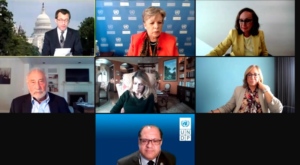 Session I on the Economic Recovery & the Future of the Social Contract[/caption]
Session I on the Economic Recovery & the Future of the Social Contract[/caption]
Alicia Bárcena, executive secretary of the United Nations Economic Commission for Latin America and the Caribbean (ECLAC), offered recommendations for the region to rebound from the economic contraction and build resilience. Countries need progressive, structural change and a full transformation centered on innovation, equality, and development. Bárcena stressed the importance of job creation, tax support for small and medium enterprises, and redistributive policies that would provide universal healthcare and a basic income for the poor. However, she noted that governments will not be able to take this on alone, and they will need to engage in international collaboration through multilateral agreements.
As a result of the systemic shock of the pandemic, governments have reevaluated the extent of their responsibilities with their citizenry. Rebeca Grynspan, secretary general of Secretaría General Iberoamericana (SEGIB), noted that the debate about building a new social contract in these countries is not new, but new norms will need to be put in place if attempts to build a new agreement are to survive. She enumerated the key elements a social contract should include as countries emerge from the crisis. A prerequisite must be a restoration of trust at a national and international level. It should include the most vulnerable populations, such as women and youth, and be a long-term agreement focused on green growth and sustainability, digital infrastructure, and progressive, fiscal reform. She stressed leadership and dialogue will be more important than ever, calling on civil society, the public and private sectors, and multilateral institutions to play a role.
The budgetary implications of the pandemic have been enormous, according to Joseph Stiglitz, Nobel laureate in economics and professor at Columbia University. In his remarks, Stiglitz stated that countries must be careful in the design of social programs: they should be targeted and sensitive to the differences across individuals and sectors, and they need to serve multiple purposes, given the lack of funds and the numerous issues that this crisis has exacerbated. Any money spent should also deal with climate change and facilitate the green transition. He warned that recovery after the 2008 recession should not be a point of reference, adding that China is not importing at the same volume it was then and countries will not be able to rely on China to pull them out of the crisis. He noted that the International Monetary Fund (IMF) and other multilateral institutions have shown leadership in offering solutions, but we need to work on strengthening these organizations so they can continue to play a critical role in moving towards longer term investment. Finally, he emphasized that controlling the pandemic should be the top priority for countries in the region, which requires trust and reliance on scientific expertise, and governments should invest and spend now, as resources invested and spent today will have positive long-lasting effects.
In her economic assessment of the region, Carmen Reinhart, vice president and chief economist at the World Bank Group, noted that Latin America’s continued dependency on commodities, external finance, and capital flows has now spanned decades, and this will result in a very long recovery period post Covid-19. Countries should begin to prepare for the quieter financial crisis lurking after the pandemic – many banks will be hit by households and small businesses defaulting on their loans, and this reality is universal across regions and income levels. She also urged policy makers to think how they will restructure non-performing assets that will result from this crisis, as countries and households will attempt to recover without credit during a period when international resources will be scarce.
Paula Santilli, chief executive officer of PepsiCo Latin America, shared that private sector leaders have an obligation to put out an optimistic tone and a willingness to bring back growth and prosperity. She highlighted the important collaborative role the private sector can play, especially in helping governments think through where resources are necessary for countries to recover. Santilli noted that there is an opportunity to transform Latin America, and the region should focus on reshaping and reinventing the digital, agricultural, and tourism industries. When asked about the resurgent interest in rural areas in the region, she agreed that they have the potential to be powerhouses, but governments still need to work on building sustainable infrastructure in those areas.
This session focused on how health systems in the region have addressed the pandemic. The conversation was moderated by Julio Frenk, president of the University of Miami and former minister of health of Mexico. Frenk began by noting how Latin America, with only 8 percent of the world’s population, has become a hotspot for Covid-19 and has one of the highest rates of cases worldwide.
Luciana Borio, former National Security Council director on Medical and Biodefense Preparedness and vice president of In-Q-Tel, noted that naturally occurring threats pose national security threats. Referencing her work on the 2018 US Strategy for Biological Threats, Borio said it outlined how the country needed to prepare not only for threats by adversaries, but also for naturally occurring biological agents. However, she argued the current US administration has moved slowly in funding the programs needed to combat Covid-19, and it has fueled a growing bias against investing in health and biological research. It’s impossible to have a strong biosecurity response without adequate investment and support for the foundation structures of public health medicine and science. She added the United States needs to work on modernizing its health infrastructure, as it failed to implement new technologies in its response to the pandemic.
[caption id="attachment_100818" align="alignleft" width="300"]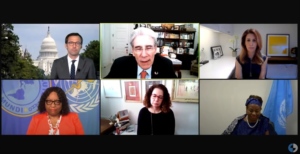 Session II on SUCCESSES & FAILURES: HEMISPHERIC HEALTH SYSTEMS SEVERELY TESTED[/caption]
Session II on SUCCESSES & FAILURES: HEMISPHERIC HEALTH SYSTEMS SEVERELY TESTED[/caption]
Carissa F. Etienne emphasized the need for regional cooperation. As executive director of Pan-American Health Organization (PAHO), Etienne stated that concerted and collective action is required from the community level to the international level. Governments must focus on promoting regional solidarity and building consensus with relevant actors so they can efficiently share and exchange information and resources, monitor the development of the pandemic, and ensure access to a future vaccine. She encouraged countries to collaborate with international organizations, private companies, and civil society groups, important stakeholders to help countries boost their fiscal capacity.
Natalia Kanem, executive director of the United Nations Population Fund (UNFPA), shared that some of the most pressing social issues that the pandemic has laid bare are not new. It has simply exposed and exacerbate the inequalities that already existed in the region. The poorest and most vulnerable populations – including women and girls, indigenous peoples, Afro-descendants, migrants, and older populations – are facing the most devastating effects of the health crisis. Services addressing sexual and reproductive health and domestic violence have been sidelined, leading to a significant increase in gender-based violence and unwanted pregnancies that is expected to continue to grow in the next few years. As discriminatory policies continue against marginalized groups, Kanem underlined the need to establish a clear, global understanding of social justice as countries address the effects of the pandemic.
Deisy Ventura, professor and director of PhD Global Health Program at the University of São Paulo, discussed the inextricable tie between health and social factors. When a state implements restrictions, as many have done in response to Covid-19, social and economic measures to benefit citizens must also be in place. On Brazil, Ventura noted that the country was considered one of the developing countries with the largest capacity to respond to the pandemic. However, Brazil’s response has been disastrous – the articulate healthcare system and structural advantage was overshadowed by political battles and the systematic obstruction of local responses by the federal government. She reiterated countries’ need to prioritize long-term healthcare infrastructure and support essential workers.
As moderator of the next panel, Yolanda Kakabadse, former minister of environment of Ecuador and former president of WWF-International, led a discussion on the relationship between climate change and the Covid-19 pandemic and the future of the environmental policy agenda. She stressed that, up until now, governments have had short-term responses to climate change accompanied by short-term investments, and this model needs to change.
Brigitte Baptiste, chancellor at the Universidad Ean, agreed with Kakabadse and noted that we have been addressing climate change through emergency responses, which consist of markets designed to move capital quickly and reposition it strategically during a crisis. However, this is not going to lead to a long-term reduction of vulnerability and the creation of sustainable practices. Despite this short-sightedness, Baptiste added that there have been important discussions at the city level to talk about climate and the environment and how it directly affects the livelihood of its citizens. These include the links between fossil fuels and air quality, and the risks of current and future generations to different pathologies. Lastly, she also emphasized the importance of conservation – natural areas are the backbone of ecological functioning and services and need to be protected from agricultural pests, human influence, and budget cuts. Governments should treat these areas as investments to protect, not as costs to maintain.
[caption id="attachment_100821" align="alignright" width="300"]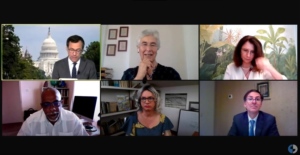 SESSION III on A CONVERSATION ON CORONAVIRUS, CLIMATE CHANGE & THE ENVIRONMENT: WHERE DOES LAC STAND?[/caption]
SESSION III on A CONVERSATION ON CORONAVIRUS, CLIMATE CHANGE & THE ENVIRONMENT: WHERE DOES LAC STAND?[/caption]
The executive director of the Instituto Clima e Sociedade (iCS), Ana Toni, mentioned that the government’s pandemic response and overall rejection of science, against the backdrop of rampant Amazonian fires, has led to a growing interest in the relationship between Covid-19 and climate change. New voices are speaking out on climate change, including Brazilian and foreign investors, private sector representatives, and the Central Bank. These discussions will result in the successful development of a bioeconomy – one which allows the economy to grow while also protecting the Amazon and other valuable resources. Toni also addressed the disproportionate impact the pandemic and the fires have had on Brazilian indigenous populations.
Although Covid-19 is a crucial and pressing issue, the pandemic has distracted countries from the bigger and longer-term crisis of climate change, noted Carlos Felipe Jaramillo, vice president for the Latin American and the Caribbean Region at the World Bank. He pointed to the unprecedented increase in forest fires, droughts, and water-related problems in the region and agreed that it is necessary to communicate this urgent issue to policymakers. On the other hand, there is reason to be cautiously optimistic: many countries have announced green plans in their Covid-19 recovery, and they are making significant investments in green projects and developing bioeconomies, including Chile, Colombia, and Brazil.
Hugh Sealy, special envoy on Climate Change for the Government of Barbados, agreed with Jaramillo and stated that the pandemic has postponed climate action for the region. It has also forced the Caribbean to rethink its entire economic strategy, given the region’s reliance on tourism, and exposed systemic deficiencies and vulnerability to climate change. Issues of water scarcity and pollution will have a long-term impact on tourism. On a positive note, Sealy pointed to the government’s plan to transform the energy sector and stop the use of fossil fuels as a step in the right direction, and he argued that island countries need a Marshall-like Plan to help them recover and tackle major climate change challenges.
The pandemic has greatly accelerated countries’ digital capacity and reliance on technology. Guillermo Arduino, anchor and correspondent for CNN Networks, moderated a panel on the region’s digital transformation and the role of the public and private sector in shrinking the digital divide. In his opening remarks, Arduino stressed the need to prioritize access to technology and connectivity in Latin America and noted that adjusting to digitalization requires great skills-adaption and resilience.
As a cybersecurity policy specialist at the Organization of American States, Kerry-Ann Barrett shared that over 50 percent of the region has strengthened its capacity to take on cybersecurity threats, but countries still generally lack the capacity to respond at a national level. The region is not ready to fully digitize – there is a lack of resources and knowledge in communities on how to do so, and governments are still prioritizing other projects that target more immediate demands. Governments should develop a strategic approach for digitalization which incorporates and recognizes varying educational needs. On access to telecommunication services, Barrett said that competition between internet and mobile service companies is key, which can be leveraged for the advantage of the consumers.
Angel Melguizo, vice president of External and Regulatory Affairs at AT&T Latin America, agreed with Barrett on the need for competition in telecommunications to help digitize low-income countries and areas. He also noted that technology can mitigate the effects of a looming recession, pointing to the advancements in 5G and the development of Internet of Things (IoT) platforms. However, existing hazards include low levels of investment and digital education and no effective regulations on technology. Companies and governments must do more to invest in technology and human capital and treat digitalization as a long-term priority.
[caption id="attachment_100830" align="alignleft" width="300"]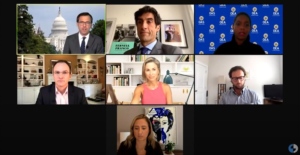 Session IV on HOPES & HAZARDS: DIGITAL TRANSFORMATION IN THE REGION[/caption]
Session IV on HOPES & HAZARDS: DIGITAL TRANSFORMATION IN THE REGION[/caption]
The pandemic has acted as the biggest accelerator of digital transformation of all time, said Silvina Moschini, co-founder and president of TransparentBusiness Inc. Society needs to facilitate remote working opportunities and find innovative uses for technology. “Remote First” companies have become the norm across sectors, leveraging talent recruitment, productivity, management, business continuity, and learning strategies as well as mitigating geographical limitations. Moschini emphasized the need to change the cultural emphasis on being “physically” present for a job, as remote work has changed the way we solve problems, exported talent across borders, and widened awareness of productivity across the region.
Laura Gaviria, director of SoftBank Group International, commented that public-private partnerships have never been more important for digital access and connectivity in the region, especially given the pandemic’s acceleration of the continent’s digital transformation. Innovative solutions from the private sector require incentives and connectivity infrastructure, both of which are provided by the government. And to build an effective digital infrastructure, investment, collaboration, and regulation are all crucial tools. Gaviria also discussed the importance of digital training for all generations and how companies can foster digital education spaces.
Digitization exposes new vulnerabilities that adversaries may and have already used to disrupt political, economic, and social systems, explained Robert Morgus, senior director of the US Cyberspace Solarium Commission. To tackle these vulnerabilities, countries need a strategic approach and cyber strategy which should address the following: regulatory frameworks, international engagement, public-private collaboration, secure networks, and risk assessments. He noted that even though the United States has done a fairly good job at digitizing and building a robust critical infrastructure, the country is still susceptible to cyberattacks.
The final day of the conference began with a panel on the impact of the pandemic on democracy and rule of law in Latin America, moderated by Michael Shifter, president of the Inter-American Dialogue. He opened the session by highlighting the importance of the date, September 11th, marks the start of the Pinochet dictatorship in Chile, of the enactment of the democratic charter in Peru and the 9/11 terrorist attacks in the United States. Shifter noted the pessimistic outlook on the state of democracy in the region continues from last year.
When asked about the impact of the pandemic on the political future of Latin America, Kevin Casas-Zamora, secretary-General of International IDEA, stated that we have yet to see the full effects. Covid-19 is not a single crisis, but a cascade of crises, and, on an individual level, people with pre-existing conditions will disproportionately be affected. Casas-Zamora added that Latin America is seeing some of the longest states of emergencies in the world along with the use of strong, punitive responses against its citizens. Constitutional courts, he said, will have an incredibly important role following the pandemic. Another factor affected by the crisis are the region’s elections – many have been postponed and may continue to be. Lastly, he concluded that the harmful economic effects of the pandemic will likely lead to political strife and violence, which could result in an increased use of force against citizens.
[caption id="attachment_100824" align="alignright" width="300"]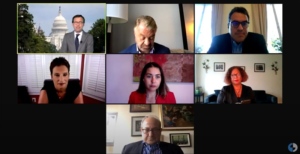 SESSION V on PANDEMIC POLITICS: IMPACT ON DEMOCRACY & RULE OF LAW IN LATIN AMERICA[/caption]
SESSION V on PANDEMIC POLITICS: IMPACT ON DEMOCRACY & RULE OF LAW IN LATIN AMERICA[/caption]
The conversation then turned to Chile. Lucia Dammert, professor of International Relations of the Universidad de Santiago de Chile, listed several fundamental factors to consider when analyzing Chile’s political situation. First, there is a dichotomy between economy and public health, and the private sector is pressuring the government to open the economy. Second, the president and his administration are not open to recommendations from the outside and the measures they enacted were not effective. Third, the communication from the government with the population has been very weak. And finally, there is a transversal center-right elite that spoke with enormous pride of the Chilean model, which, as the pandemic has shown, is not a solution to all Latin America’s problems. Dammert said the pandemic has strengthened the need to change the Chilean constitution and to develop a new social contract. The government cannot play a subsidiary role for social needs and cannot rely on the private sector to address them. The new constitution needs to allow for new voices to participate in the democratic process, such as the indigenous population. Lastly, she shared that the 2019 protests, not the violence, were necessary for facilitating discussion and enacting change, which will prompt other countries to do the same.
Despite Mexican President Andres Manuel López Obrador’s poor management of the pandemic, Jorge Castañeda, global distinguished professor of LAC Studies at New York University, explained that the president has continued to receive high approval ratings because of his likability and his mandate to fight corruption. However, criticisms have started to grow, as Mexico has the most Covid-19-related deaths in the region per 100,000 inhabitants, with many cases going underreported. The impact on society has been tremendous, given that there is no employment insurance nor social safety nets. Violence in the country is also at an all-time high. On corruption, Castañeda noted that some of AMLO’s measures have had the opposite effect – by reducing the salaries and benefits of mid-level public employees, corruption increases due to the frequent turnover of government workers. He added that the president is concerned he will lose the midterm elections, which may explain his growing authoritarian tendencies and frequent attacks against the media and civil society.
Monica de Bolle, senior fellow at the Peterson Institute for International Economics, described the concerning Covid-19 situation in Brazil. Like in Mexico, the government has not managed the pandemic well, and cases are going underreported. There is an ongoing debate about the closure of schools, leaving many children without access to food. De Bolle said that President Jair Bolsonaro has won the narrative battle and continues to fare high in opinion polling. This is likely due to the emergency stimulus package approved in April that benefitted over 100 million people. There is no organized opposition with a common strategy, de Bolle argued, that can counter Bolsonaro, so his path to win reelection in 2021 is completely open. She stressed this is a serious issue for democracy in Brazil, given Bolsonaro’s populist and authoritarian tendencies.
Lastly, Luz Mely Reyes, director and co-founder of Efecto Cocuyo, discussed the devastating conditions in Venezuela underlying the pandemic. There is a lack of connectivity, communication, and mobility among the population as well as the scarcity of gas in the country resulting from the sanctions placed on the Maduro government. The vast levels of inequality and weak infrastructure have also made it difficult for people to access hospitals and medical treatment. Furthermore, the lack of government transparency and underreporting of cases has made it difficult to quantify the full effect of the pandemic. Mely Reyes then turned to the parliamentary elections of the National Assembly and added that they may mark the end of the last democratically elected, governmental body. In addition to facing difficulties in finding information on candidates, Venezuelans are more concerned with fixing their daily problems than participating in the elections or understanding the electoral context.
The 24th edition of the conference ended with a discussion on this year’s US presidential election and the impact US-Latin American relations. The panel was moderated by Gabriela Frias, business anchor for CNN en Español. The conversation featured Roger Noriega, visiting fellow for the American Enterprise Institute, and Julissa Reynoso, partner at Winston & Strawn LLP. Noriega previously served as the assistant secretary of state for Western Hemisphere Affairs and the US ambassador to the OAS, while Reynoso is the former US ambassador to Uruguay and deputy assistant secretary for Western Hemisphere Affairs.
[caption id="attachment_100827" align="alignleft" width="300"]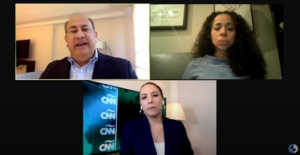 SESSION VI on US PRESIDENTIAL ELECTIONS: IMPLICATIONS FOR LAC[/caption]
SESSION VI on US PRESIDENTIAL ELECTIONS: IMPLICATIONS FOR LAC[/caption]
Noriega and Reynoso stressed the high stakes of this year’s presidential election in the context of Covid-19 as they discussed the potential impact of either candidate’s presidency on immigration and border security, the economy, and foreign relations. They analyzed the key differences between the US-LAC foreign policy agenda of President Donald Trump and Vice President Joe Biden, noting how US relations with Brazil, Venezuela, Cuba, and Central America may drastically differ under the Republican or Democratic nominee. The future of these relationships will also depend on the composition of the US congress after the election. Finally, both panelists agreed that there is common ground around combatting China’s influence in the region and commented on how to increase the participation of women and young voters in this election cycle.
In the past year, the Bolivian government has emerged as an outspoken critic of climate change policies.
As global temperatures continue to rise with the global community stalled on any way to stop them, countries must prepare to adapt to increasingly volatile environmental conditions.
The Inter-American Democratic Charter is a watershed in how the region understands democracy.
